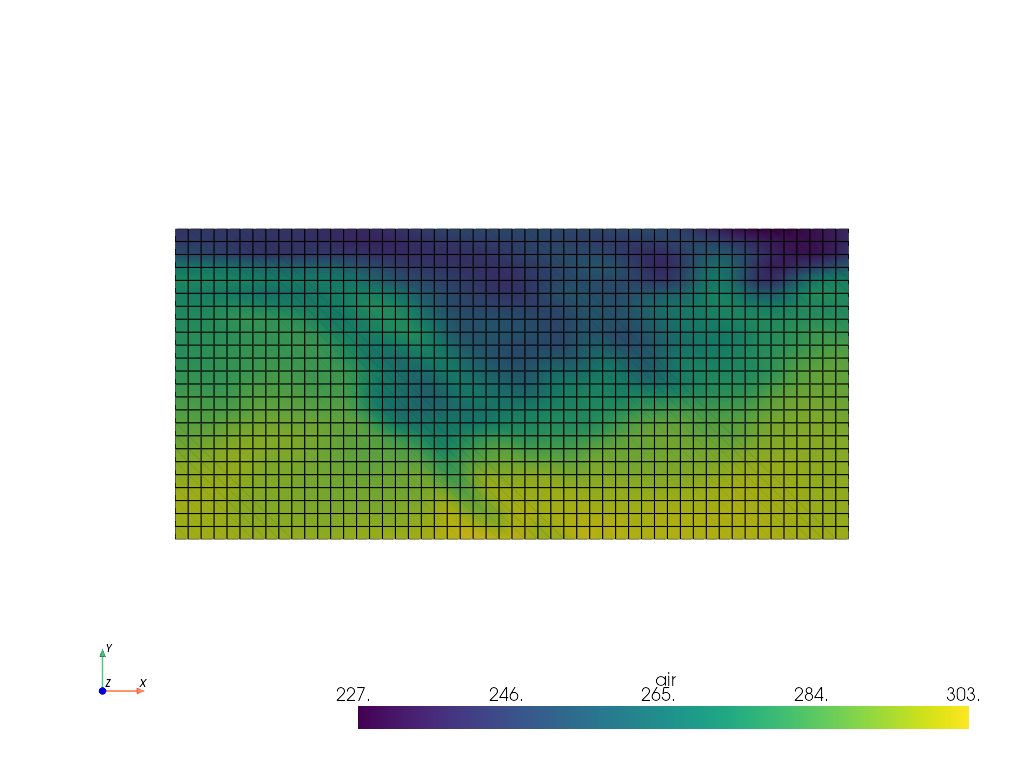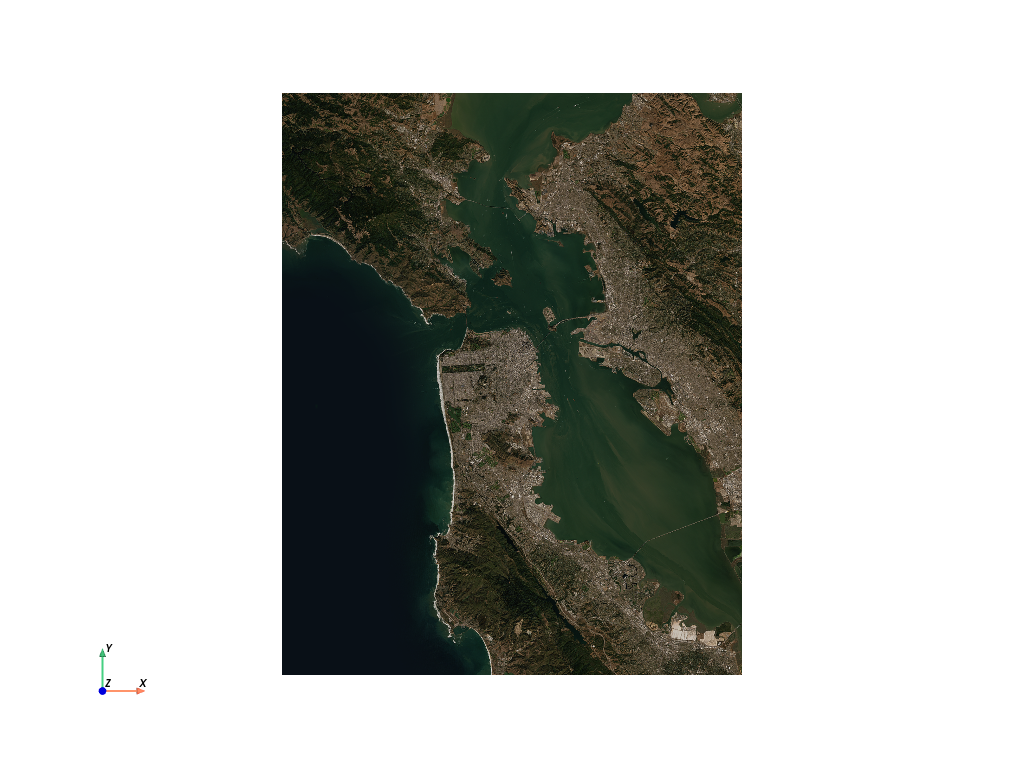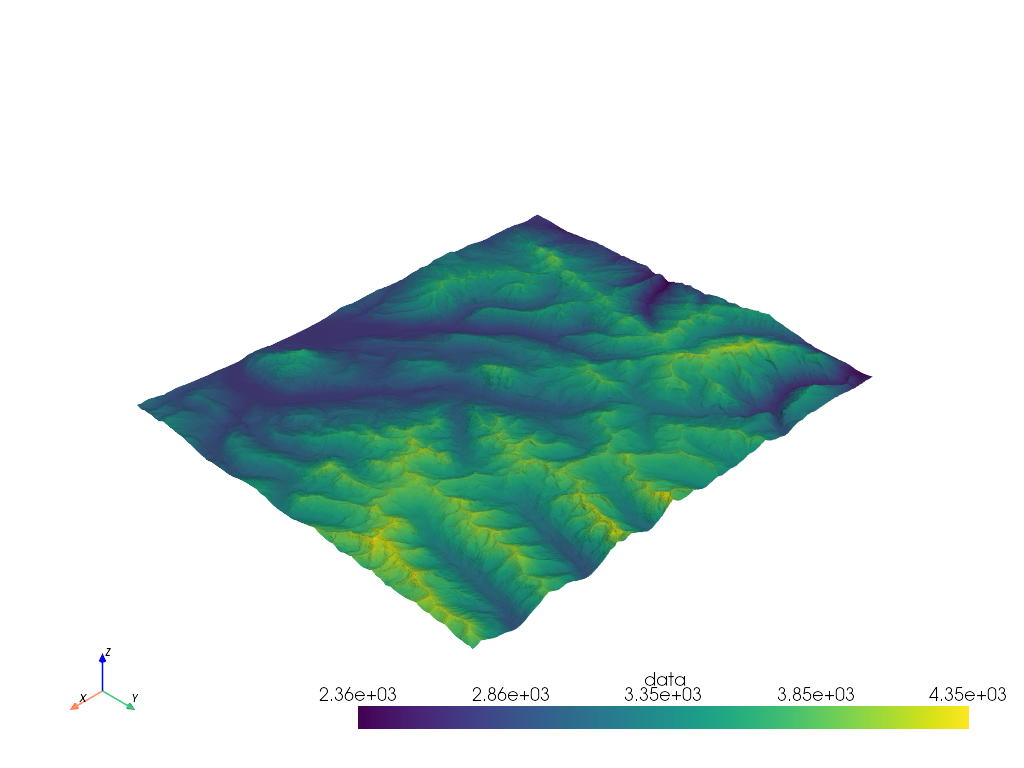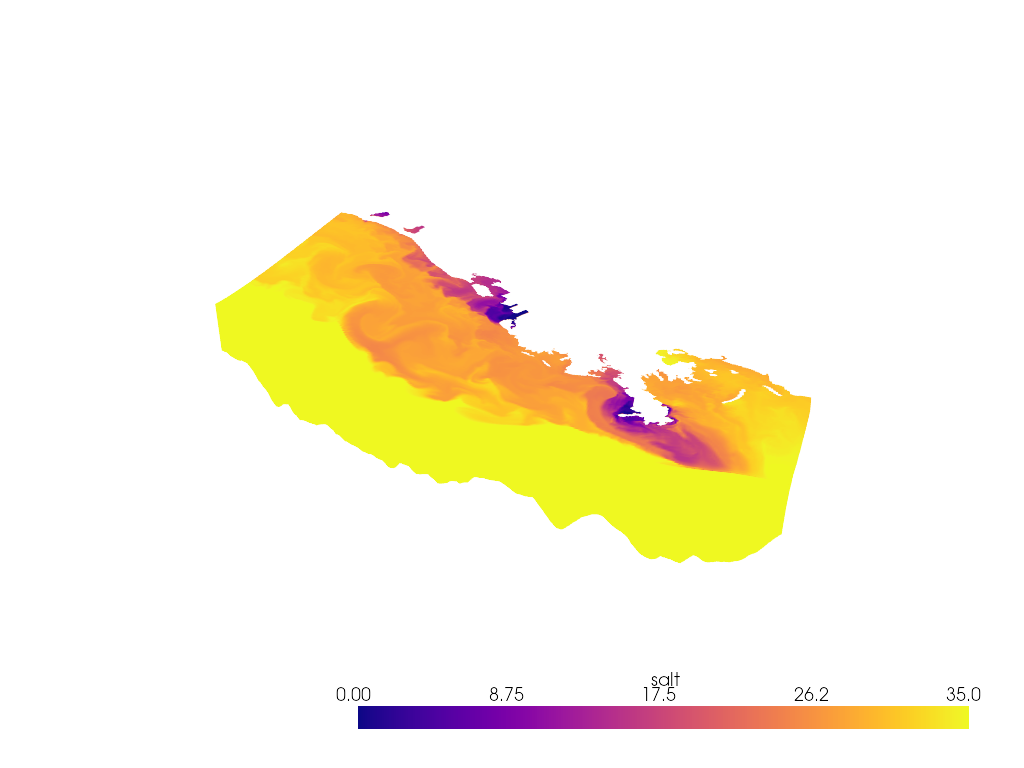xarray DataArray accessors for PyVista to visualize datasets in 3D
You must import pvxarray in order to register the DataArray accessor with
xarray. After which, a pyvista namespace of accessors will be available.
Try on MyBinder: https://mybinder.org/v2/gh/pyvista/pyvista-xarray/HEAD
The following is an example to visualize a RectilinearGrid with PyVista:
import pvxarray
import xarray as xr
ds = xr.tutorial.load_dataset("air_temperature")
da = ds.air[dict(time=0)] # Select DataArray for a timestep
# Plot in 3D
da.pyvista.plot(x="lon", y="lat", show_edges=True, cpos='xy')
# Or grab the mesh object for use with PyVista
mesh = da.pyvista.mesh(x="lon", y="lat")Or you can read VTK meshes directly to xarray:
import xarray as xr
ds = xr.open_dataset("data.vtk", engine="pyvista")
ds["data array"].pyvista.plot(x="x", y="y", z="z")Conda makes managing pyvista-xarray's dependencies across platforms quite
easy and this is the recommended method to install:
conda install -c conda-forge pyvista-xarrayIf you prefer pip, then you can install from PyPI: https://pypi.org/project/pyvista-xarray/
pip install pyvista-xarrayMany of the examples leverage brand new features in PyVista v0.38.1 and
GeoVista which may not yet be released when you're reading this. Here is a list
of pull requests needed for some of the examples:
- GeoVista algorithm support: bjlittle/geovista#127
Work that was required and merged:
- pyvista/pyvista#2698
- pyvista/pyvista#2697
- pyvista/pyvista#3318
- pyvista/pyvista#3556
- pyvista/pyvista#3385
Please share your thoughts and questions on the Discussions board. If you would like to report any bugs or make feature requests, please open an issue.
If filing a bug report, please share a scooby Report:
import pvxarray
print(pvxarray.Report())The following are a few simple examples taken from the xarray and
rioxarray documentation. There are also more sophisticated examples
in the examples/ directory in this repository.
import numpy as np
import pvxarray
import xarray as xr
lon = np.array([-99.83, -99.32])
lat = np.array([42.25, 42.21])
z = np.array([0, 10])
temp = 15 + 8 * np.random.randn(2, 2, 2)
ds = xr.Dataset(
{
"temperature": (["z", "x", "y"], temp),
},
coords={
"lon": (["x"], lon),
"lat": (["y"], lat),
"z": (["z"], z),
},
)
mesh = ds.temperature.pyvista.mesh(x="lon", y="lat", z="z")
mesh.plot()import pvxarray
import rioxarray
import xarray as xr
da = rioxarray.open_rasterio("TC_NG_SFBay_US_Geo_COG.tif")
da = da.rio.reproject("EPSG:3857")
# Grab the mesh object for use with PyVista
mesh = da.pyvista.mesh(x="x", y="y", component="band")
mesh.plot(scalars="data", cpos='xy', rgb=True)import pvxarray
import rioxarray
da = rioxarray.open_rasterio("Elevation.tif")
da = da.rio.reproject("EPSG:3857")
# Grab the mesh object for use with PyVista
mesh = da.pyvista.mesh(x="x", y="y")
# Warp top and plot in 3D
mesh.warp_by_scalar().plot()import pvxarray
import pyvista as pv
import xarray as xr
ds = xr.tutorial.open_dataset("ROMS_example.nc", chunks={"ocean_time": 1})
if ds.Vtransform == 1:
Zo_rho = ds.hc * (ds.s_rho - ds.Cs_r) + ds.Cs_r * ds.h
z_rho = Zo_rho + ds.zeta * (1 + Zo_rho / ds.h)
elif ds.Vtransform == 2:
Zo_rho = (ds.hc * ds.s_rho + ds.Cs_r * ds.h) / (ds.hc + ds.h)
z_rho = ds.zeta + (ds.zeta + ds.h) * Zo_rho
ds.coords["z_rho"] = z_rho.transpose() # needing transpose seems to be an xarray bug
da = ds.salt[dict(ocean_time=0)]
# Make array ordering consistent
da = da.transpose("s_rho", "xi_rho", "eta_rho", transpose_coords=False)
# Grab StructuredGrid mesh
mesh = da.pyvista.mesh(x="lon_rho", y="lat_rho", z="z_rho")
# Plot in 3D
p = pv.Plotter()
p.add_mesh(mesh, lighting=False, cmap='plasma', clim=[0, 35])
p.view_vector([1, -1, 1])
p.set_scale(zscale=0.001)
p.show()



